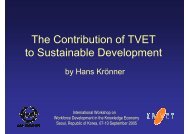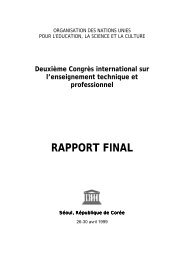Learning for Life, Work and the Future Initial ... - Unesco-Unevoc
Learning for Life, Work and the Future Initial ... - Unesco-Unevoc
Learning for Life, Work and the Future Initial ... - Unesco-Unevoc
Create successful ePaper yourself
Turn your PDF publications into a flip-book with our unique Google optimized e-Paper software.
<strong>Learning</strong> <strong>for</strong> <strong>Life</strong>, <strong>Work</strong> <strong>and</strong> <strong>the</strong> <strong>Future</strong> Participants’ Papers Page 49<br />
• Student-designed modules.<br />
• Research modules.<br />
• The accreditation of prior learning against defined<br />
modules.<br />
• The award of credit <strong>for</strong> <strong>the</strong> successful completion of<br />
individual modules.<br />
• The accumulation of credits over a period of time,<br />
especially <strong>for</strong> working professionals, to complete an<br />
award.<br />
• Modular programmes often capable of being<br />
delivered with degrees of flexibility to allow<br />
students variable start times, negotiable lengths of<br />
study time <strong>for</strong> modules <strong>and</strong> programmes, <strong>and</strong><br />
choices about attendance, study methods <strong>and</strong><br />
assessment occasions.<br />
A CAT Scheme should make provision <strong>for</strong> a defined<br />
group of technical <strong>and</strong> vocational education teachers<br />
<strong>and</strong> managers. The Scheme Document should also<br />
define <strong>the</strong> QA principles <strong>and</strong> procedures <strong>for</strong> <strong>the</strong><br />
validation of programmes <strong>and</strong> modules, <strong>the</strong> evaluation<br />
of programmes, <strong>and</strong> <strong>the</strong> systems <strong>for</strong> <strong>the</strong> assurance of<br />
st<strong>and</strong>ards of student per<strong>for</strong>mance. Although credit can<br />
be awarded <strong>for</strong> prior learning, <strong>for</strong> <strong>the</strong> majority of<br />
students most credit will be gained through <strong>the</strong> study of<br />
<strong>the</strong>ir subject as organised into modules.<br />
Modules should be defined primarily through <strong>the</strong>ir<br />
outcomes. A module will usually have several<br />
specified outcomes, although a project module may be<br />
described by one main outcome.<br />
Competence outcomes are primarily concerned with<br />
undertaking work-based tasks. Each statement of<br />
competence should have a context within which it can<br />
be demonstrated to:<br />
• Derive from a work role of <strong>the</strong> teacher (it should be<br />
work-related).<br />
• Be judged against pre-specified criteria.<br />
• Be a measure of what <strong>the</strong> student can do at a<br />
particular point in time.<br />
Cognitive outcomes provide a framework <strong>for</strong><br />
‘academic’ learning, which is related to an area of<br />
professional practice. They include: knowledge <strong>and</strong><br />
underst<strong>and</strong>ing of <strong>the</strong> subject, <strong>the</strong> ability to apply <strong>the</strong><br />
knowledge in different situations, <strong>the</strong> ability to analyse<br />
problems <strong>and</strong> propose solutions, <strong>and</strong> <strong>the</strong> evaluation of<br />
learning outcomes, particularly in relation to problems.<br />
The assessment of a student’s evidence of learning in<br />
an outcomes-based module will be against criteria <strong>and</strong><br />
st<strong>and</strong>ards. Both fellow assessors <strong>and</strong> external verifiers<br />
will verify judgements of assessors about <strong>the</strong> award of<br />
module credit.<br />
6. Occupational St<strong>and</strong>ards<br />
An occupational role can be defined by <strong>the</strong> st<strong>and</strong>ards<br />
of competence <strong>and</strong> knowledge needed <strong>for</strong> effective<br />
operation in that role; in most such frameworks <strong>the</strong><br />
occupational level is connected also to <strong>the</strong> normally<br />
expected academic/ professional qualifications of<br />
people in <strong>the</strong> role.<br />
7. Continuing Professional Development<br />
The concept of lifelong learning translates into vocational<br />
<strong>and</strong> professional areas as Continuing Professional<br />
Development, <strong>and</strong> is commonly included as an<br />
element in professional occupational st<strong>and</strong>ards. It is<br />
vitally important that professional staff in TVE have<br />
<strong>the</strong> requirements to work within such a culture <strong>and</strong> a<br />
framework: this is probably <strong>the</strong> key element in <strong>the</strong><br />
development of a sustainable quality of TVE provision.<br />
8. Regional Co-operation<br />
This paper suggests that if it were possible to develop<br />
some common concepts <strong>and</strong> practices in <strong>the</strong> business<br />
of TVE staff development, <strong>the</strong>n many lines of active<br />
co-operation would be easier to sustain. There are<br />
many ways in which practitioners can be mutually<br />
supportive. Regular meetings, seminars <strong>and</strong> conferences<br />
should, with careful planning, bring significant<br />
<strong>and</strong> mutual rewards. Electronic means of communication<br />
offer many opportunities. But it is probable that<br />
more important benefits to staff developers’ knowledge<br />
<strong>and</strong> capabilities would come from exchange <strong>and</strong><br />
professional interaction in teaching, developing<br />
materials <strong>and</strong> research, in <strong>the</strong> employment of staff from<br />
o<strong>the</strong>r countries in <strong>the</strong> verification of st<strong>and</strong>ards of<br />
students’ achievement <strong>and</strong>, in <strong>the</strong> short-term, through<br />
shared expertise <strong>and</strong> experience. In addition, preservice<br />
<strong>and</strong> in-service teachers-in-training could be<br />
regionally mobile by using <strong>the</strong> mechanisms <strong>for</strong> transfer<br />
of credit <strong>and</strong> <strong>the</strong> accreditation of prior learning.<br />
9 KOKORWE, Doreen <strong>and</strong> TIDIMANE, Christopher (Botswana): Access to TVET<br />
1. Background<br />
Vocational training institutions in Botswana were<br />
started in 1965 with only one, based at Swaneng Hill<br />
School. They grew over <strong>the</strong> years, <strong>and</strong> today we have<br />
47 of <strong>the</strong>m in place. Of <strong>the</strong>se, six are technical<br />
colleges <strong>and</strong> 41 are brigades. Technical colleges are<br />
government-owned institutions that offer technical <strong>and</strong><br />
vocational programmes at NCC level. Brigades are<br />
community-based institutions that offer training with





